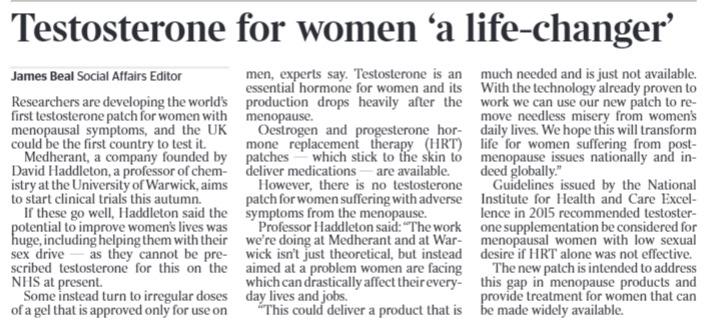In Monday’s edition of The Times, James Beal, Social Affairs Editor, covered a story headlined “Testosterone for women a ‘life-changer’.
The gist of the article is this:
Researchers at the University of Warwick are developing the world’s first testosterone patch for women experiencing menopausal symptoms. Medherant, a company founded by Professor David Haddleton, plans to begin clinical trials in autumn.
If successful, the patch could significantly improve women’s lives, including boosting their sex drive, as they are currently not prescribed testosterone on the NHS. Women may resort to using irregular doses of testosterone gel, which is approved only for men.
While oestrogen and progesterone hormone replacement therapy patches are available, no testosterone patches exist for women suffering from menopause-related issues.
The new patch aims to address this gap in menopause products and provide a widely accessible treatment option for women.

You will notice how this is all framed as a positive, which is odd when you consider that testosterone, according to anti-trans people, the ones The Times likes to platform, is often described as poison when trans masculine people take it.
The Times are one of the leading voices in the relentless persecution of trans people in the UK media over the last load of years. This is not news.
Like all of their ilk, they do not notice their own hypocrisy, or, if they do, they don’t care.
When cis people want or need hormones, that’s ‘normal’ which, of course, is at the root of this entire trans panic – trans people are not seen as ‘normal’.
This double standard clearly reveals the dangerous prioritisation of cisgender individuals’ needs and desires over the well-being and dignity of transgender people.
But trans people already know we live in a world that values even the sex lives of cis people over the actual lives of trans.
Articles by Beal on various topics related to gender and identity simply serve to underscore the skewed perspective held by The Times and other similar media outlets.
Other James Beal articles
- Gone with the Wind gets trigger warning over ‘hurtful racism’
- One in four Gen Z adults use genderless pronouns
- Claire Fox: students cancel peer’s talk over Ricky Gervais trans joke
- Female prison ban for trans violent inmates comes into force
- Strikes are about the money, left-wing doctor said
- Anthony Horowitz hurt by cuts to book after ‘sensitivity read’
- ‘Sexist’ Jane Austen novel too upsetting for students, says university
- Britons between 16 and 24 are twice as likely to identify as trans
- Keir Starmer critical of changing gender at 16 amid row over Scottish law
- More than 250,000 people identify as trans in census










